(ARCHIVE) Fender Vibrasonic Reverb 100w 1x15" Guitar Combo Amp 1973
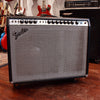
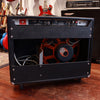
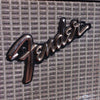
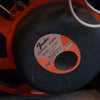
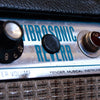
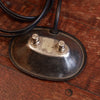
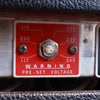
- Description
- Guitarchives
Fender Vibrasonic Reverb, made in USA 1973. This is a rare and convincing amp, it's quite something. The Vibrasonic is very similar to the iconic Twin Reverb, but with one key difference: it's got a single 15" speaker made by JBL, rather than the standard pair of 12" drivers in a Twin. We got this one off a local guitar player who's owned it since 1980; he used to gig around the state in country bands. The original owner before that was a busy pedal-steel player from the north of the state. Our local amp wizard has replaced the filter caps and brought it back to good working order, as well as going a bit further and converting the specs over to Blackface style, see the detailed notes below. The mods mean a smoother, thicker sound with a less janky path to light breakup. The tone on offer really is awesome. It's clear, full and warm, with a sparkly sweetness on the top end. The low end on offer from the huge speaker is pretty compelling, it adds a girth and weight to chords that's super addictive to hear. It takes pedals very happily and gets along well with all manner of different guitars, although it's brimming clarity can be a little unforgiving, so you'll have to keep your practice up. Finding another one of these in this part of the world is nigh on impossible, so if you're after a cool and unusual vintage piece, here's a prime example.
Model: Fender Vibrasonic Reverb
Made: Fullerton USA, 1973 (serial B13239)
Output: 100 Watts
Power: 240v (Australia/NZ)
Speaker: original JBL 15" D130F
Tubes: 4 x 6L6GC output tubes, 3 x 7025, 1 x 12AX7 and 2 x 12AT7 preamp stage
Channels: 2, normal and vibrato
Mods: kick-stand removed and missing, extra divider added in the back adjacent to speaker, voltage rotary switch removed, plus see the technician's repair notes below
Weight: 40kg approx
Extras included: footswitch, some original parts
Condition notes: minor cosmetic wear. No major rips in the tolex, just a few scuffs here and there. Overall: very good condition (8/10)
Tech's notes: The work done was quite extensive, starting with replacement of all electrolytic capacitors in the amp (power supply filter caps, bias supply filter cap, and cathode bypass caps).
The power supply rectifier board and bias supply rectifier were rebuild using modern 1N4007 diodes.
Power supply dropping resistors and bleed resistors were replaced with 2W and 3W metal oxide resistors, to 'blackface' values.
All preamp plate load resistors were replaced with 1W carbon film resistors to improve reliability and lower noise floor (old carbon comp resistors are prone to drifting in value and hissing).
Bias circuit was modified from the silverface fixed value balance adjustable circuit, to properly adjustable blackface style bias adjustment.
Phase inverter resistor values changed to blackface values using 1W carbon film resistors. Switchable boost circuit removed, and master volume pot replaced with Alpha 1M logarithmic pot (note the master volume is absent in a true blackface circuit, however I didn't want to leave an empty hole in the faceplate).
Reverb circuit values changed to blackface specs (with the exception of leaving the 560pF cap in place which aids stability and tone).
Power tube screen resistors replace with 3W metal oxide resistors for reliability.
Tremolo grounding scheme modified to reduce ticking and thumping.
Relocate standby switch and associated wiring back to original location on rear panel, and plug hole on front panel.
Rewire fuse holder to act on the active AC line rather than neutral line.
Set output tube bias.
Test both on the bench with resistive load and scope (amp made close to 105W clean), and in the cabinet with guitar.
Servicing work by Brookfield Tube Audio.
https://www.brookfieldtubeaudio.com.au/
This listing is an archived entry. We love to look back and remember fondly what characters we've had through the store, so we keep them around for reference.







